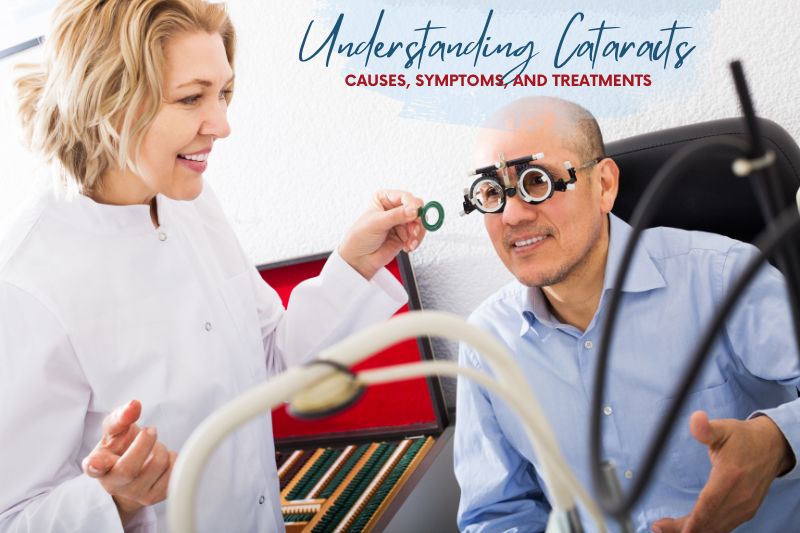Cataracts are a common eye condition that can lead to clouded vision and eventually blindness. As we get older, it becomes more important than ever to take proactive steps in preventing and managing this condition. Fortunately, there is a lot you can do as a senior aged 55 or over to reduce the risk of developing cataracts or cope with their onset if they occur. Read on for tips on how to protect your eyesight from one of the most common causes of vision impairment among seniors!
What is a Cataract and How it Affects Your Vision
A cataract occurs when the eye’s natural lens, located behind the iris and pupil, becomes clouded. It is the leading cause of vision loss in individuals aged 40 and above and is the primary contributor to blindness on a global scale. Over time, cataracts may grow larger and cloud more of the lens, making it harder to see. People commonly describe the condition as similar to looking through a foggy window or a piece of wax paper. Cataracts can make it difficult to read, drive a car, or even see the expression on a friend’s face, hence severely impacting everyday life.
The Risk Factors of Cataracts
Several factors increase the risk of developing cataracts. Age is the most significant, with most cataract cases occurring in adults over 60. However, other risk factors include prolonged exposure to UV radiation, diabetes, hypertension, obesity, smoking, and excessive alcohol consumption. Genetic predisposition also plays a role, so having a family history of cataracts can make you more susceptible. Certain medications, especially corticosteroids, can also contribute to cataract development. It is crucial to be aware of these risk factors so you can take proactive steps to protect your vision. Regular eye check-ups enable early detection and management of potential problems.
How to Prevent Cataracts
Preventing cataracts involves taking measures to protect your eye health. Firstly, ensure you are wearing sunglasses with total UV protection when exposed to sunlight, as UV radiation can accelerate cataract formation. Include plenty of fruits and vegetables in your diet, particularly those rich in antioxidants and vitamin C, which have been linked to a reduced risk of cataracts. Regular exercise can help reduce the risk of cataracts by lowering your chances of developing conditions like diabetes and hypertension.
Avoid unhealthy habits like smoking and excessive alcohol consumption, as both have been linked to an increased risk of cataract formation. If your family has a history of cataracts, it is particularly important to monitor your eye health carefully. Lastly, certain medications may increase cataract risk, so always discuss potential side effects with your doctor. Regular eye check-ups can help detect cataracts early, allowing for effective management and treatment to preserve your vision.
Tips for Eye Care and Vision Protection
Safeguarding your eyes goes beyond just the prevention of cataracts. Here are some general tips to keep your eyes healthy and your vision sharp:
- Regular eye examinations can help detect issues early.
- Consuming a healthy diet rich in nutrients can ward off age-related vision problems.
- Limiting screen time and taking breaks can prevent digital eye strain.
- Stay hydrated to prevent dryness and irritation of the eyes.
- Use proper lighting and avoid working in dim or harsh light.
- Get adequate sleep to avoid eye-related problems.
- Treatment and Surgery Options for Cataracts
Various treatment options are available to alleviate symptoms and restore sharp vision. For mild cases, non-surgical options like prescription eyeglasses can be effective. However, more severe cases may necessitate surgery. The surgical procedure, known as phacoemulsification, involves removing the cloudy lens and replacing it with a clear, artificial one. This minimally invasive surgery typically takes around 30 minutes, with a short recovery time. Most patients experience improved vision within a few days. It is crucial to consult with an eye doctor to determine the most suitable treatment plan for individual cases. Many individuals find cataract surgery to be a safe and effective method to regain clear vision.
Understanding cataracts, their risk factors, and prevention methods is essential for maintaining healthy vision, especially in senior years. Regular eye examinations, a nutritious diet, and maintaining a healthy lifestyle are paramount to decreasing the risk of developing cataracts. While cataracts can often be managed with non-surgical treatments, surgery is an effective option for more severe cases. Cataract prevention and treatment is a journey that starts with awareness and education, so it is important to stay informed and proactive about your eye health. Remember, your vision is a precious asset, and taking the necessary steps to protect it can enhance your quality of life.




